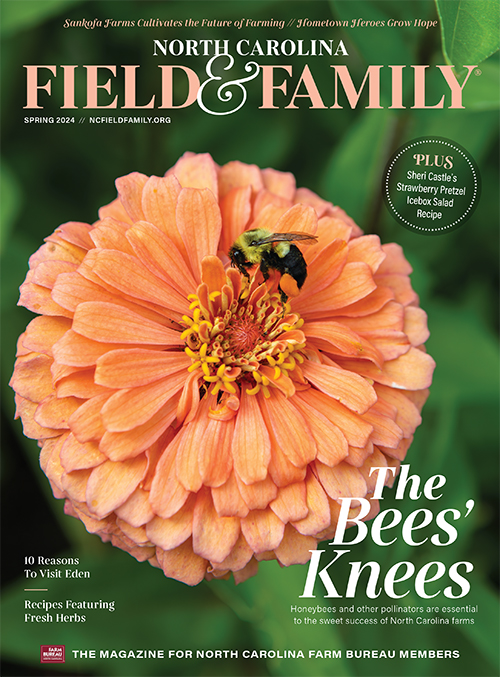Eagle’s Nest Berry Farm Offers Sweet Summer Experiences
Eagle’s Nest Berry Farm in Jackson Springs is a thriving U-pick and wholesale berry operation with 4 acres of blueberries and a half-acre of blackberries.
Julie Strauss Bettinger |
Larry Richardson had a plan: He was going to carve a berry farm out of property that had been in his family since the mid-1900s. The retired Navy captain worked closely with an Extension agent to map out the Jackson Springs tract – sections with lower pH levels would be planted with blueberries, higher PH areas would be reserved for blackberries. The map for his operation was meticulously detailed.
In the spring of 2000, the farm had about 100 blueberry bushes and Richardson’s family members came together for a barn raising. But three days into the project, the 58-year-old Richardson suffered a heart attack and died.
His widow and adult children were determined to carry out his mission. With the support of their husbands, two of Richardson’s daughters rearranged their lives and implemented his plan. Because the farm was where their father and his wife, Martha, hoped to build a home, they called it Eagle’s Nest. The title helps honor the eagle wings insignia on their father’s pilot uniform.
Today, Eagle’s Nest Berry Farm is a thriving U-pick and wholesale berry operation with 4 acres of blueberries and a half-acre of blackberries. The remaining balance of their 400 total acres is in timber.

A Perfect Pick
At launch, Eagle’s Nest was strictly a wholesale business, says Karyn Ring, Richardson’s youngest daughter. Around 2006, they decided to add a U-pick option – and Ring admits they were initially concerned about having total strangers on the property. But they took the risk that summer and discovered it was fun to have families, especially children, on the farm. Ring says her father would be pleased.
Located about 15 minutes west of Pinehurst, the berry farm is a little bit off the beaten path, but word of mouth has built a loyal customer base. “Every day we pick, we generally sell out,” she says.
Eagle’s Nest has gained a reputation for larger-size berries and plenty of them, except in years of extreme weather conditions. “Over the years, we’ve learned to prune better,” Ring says. Some U-picks don’t prune and never mulch, which makes for smaller berries.
A trick she’s also learned is to water daily, which trains the berries, so they don’t absorb as much water with excessive rainfall. “If you don’t and you get a thundershower or a lot of rain, the berries will swell up and split,” she says. “Then you’ve got sticky berries and a lot of bees.”
Around 2014, Eagle’s Nest transitioned to organic fertilizers for the blueberries. They now fertilize with soybean meal and feather meal. “And we’re probably going to go to an organic spray for fertilizers,” Ring says. “I think it will be more effective.”
They weren’t able to find the right organic combination for the blackberries, however. Blame it on the spotted wing drosophila. “There’s nothing we can do (organically) to keep that fruit fly from taking over,” she says. After the blackberries, the fruit flies generally move on to the blue, so she’s not taking any chances.

Shaping the Next Generation
A few years ago, Ring’s sister, Elaina Overby, received a grant through the University of Mount Olive to start an educational area on the farm for kids.
“To get them outdoors and learn where their food comes from,” Ring says, “not from a package in a grocery store.”
They named it The Landing at Eagle’s Nest Farm, to go along with the aviator theme. It had to be suspended last year because of the COVID-19 pandemic, but the sisters are considering options for relaunch. They’re also talking to their family’s next generation – Elaina’s adult children – who are interested in the agritourism aspects. Plans for a wedding and party venue are already in the works.
See more: A Bounty of Blueberry Recipes
Location: 1556 Currie Mill Rd., Jackson Springs Phone: (910) 639-3966 Website: eaglesnestberryfarm.com Hours: By appointment only on Monday, Wednesday, Friday and Saturday mornings. Blueberry season typically begins in June, but please text or call ahead for fruit availability.If You Go
Eagle’s Nest Berry Farm
As far as the berries go, Ring says she still counts on the wisdom of her Extension agent, like her father did. “They’ll match you with grants, the markets, the co-ops and they’ll keep you able to produce,” she says. Partnerships with the Natural Resources Conservation Service, forestry consultants and an agronomist have also helped keep them going. “We could never have done it without them,” Ring says.
See more: Farm Facts: Blueberries
Relationships among the ag community have been their saving grace at times too. Facing threats from a late frost one year, a farming family brought a pump and irrigation pipes to put water on the blueberries to encase them in ice at the bloom stage. “It worked,” she says, and that year’s crop was saved.
Best of all, that assistance came without expecting compensation.
“It’s a community,” Ring says. “All of us farmers – together.”

Pickin’ Parties
Eagle’s Nest Berry Farm isn’t the only place in North Carolina to pick your own berries. Though the pandemic has affected local blueberry festivals in 2020 and 2021, most agritourism is still a social distance-friendly activity, and many farms are seeing even more interest than usual or have set up timed entries to ensure a safe experience for visitors.
Take your pick of blueberry farms across the state, many of which also offer blackberries and other seasonal produce too. To find a pick-your-own berry farm near you, download the Visit NC Farms app or visit gottobenc.com/agritourism.
– Julie Strauss Bettinger


